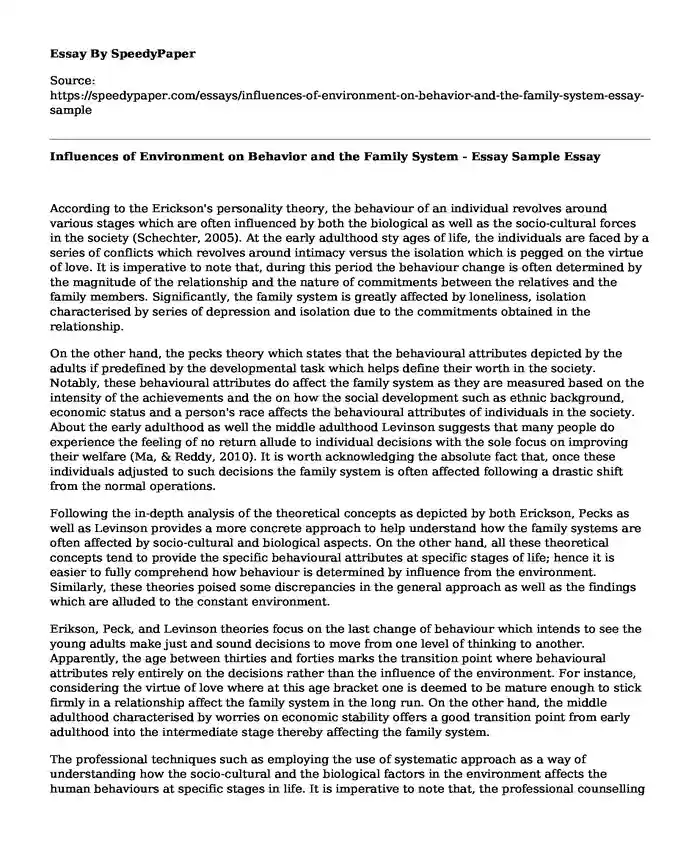
| Type of paper: | Essay |
| Categories: | Family Personality Personal development |
| Pages: | 3 |
| Wordcount: | 630 words |
According to the Erickson's personality theory, the behaviour of an individual revolves around various stages which are often influenced by both the biological as well as the socio-cultural forces in the society (Schechter, 2005). At the early adulthood sty ages of life, the individuals are faced by a series of conflicts which revolves around intimacy versus the isolation which is pegged on the virtue of love. It is imperative to note that, during this period the behaviour change is often determined by the magnitude of the relationship and the nature of commitments between the relatives and the family members. Significantly, the family system is greatly affected by loneliness, isolation characterised by series of depression and isolation due to the commitments obtained in the relationship.
On the other hand, the pecks theory which states that the behavioural attributes depicted by the adults if predefined by the developmental task which helps define their worth in the society. Notably, these behavioural attributes do affect the family system as they are measured based on the intensity of the achievements and the on how the social development such as ethnic background, economic status and a person's race affects the behavioural attributes of individuals in the society. About the early adulthood as well the middle adulthood Levinson suggests that many people do experience the feeling of no return allude to individual decisions with the sole focus on improving their welfare (Ma, & Reddy, 2010). It is worth acknowledging the absolute fact that, once these individuals adjusted to such decisions the family system is often affected following a drastic shift from the normal operations.
Following the in-depth analysis of the theoretical concepts as depicted by both Erickson, Pecks as well as Levinson provides a more concrete approach to help understand how the family systems are often affected by socio-cultural and biological aspects. On the other hand, all these theoretical concepts tend to provide the specific behavioural attributes at specific stages of life; hence it is easier to fully comprehend how behaviour is determined by influence from the environment. Similarly, these theories poised some discrepancies in the general approach as well as the findings which are alluded to the constant environment.
Erikson, Peck, and Levinson theories focus on the last change of behaviour which intends to see the young adults make just and sound decisions to move from one level of thinking to another. Apparently, the age between thirties and forties marks the transition point where behavioural attributes rely entirely on the decisions rather than the influence of the environment. For instance, considering the virtue of love where at this age bracket one is deemed to be mature enough to stick firmly in a relationship affect the family system in the long run. On the other hand, the middle adulthood characterised by worries on economic stability offers a good transition point from early adulthood into the intermediate stage thereby affecting the family system.
The professional techniques such as employing the use of systematic approach as a way of understanding how the socio-cultural and the biological factors in the environment affects the human behaviours at specific stages in life. It is imperative to note that, the professional counselling relies on the sufficient identification of the relationship that exists between contributing factors from the environment and the behavioural attributes exhibited by individuals ate each developmental stages. Similarly, by identifying the behaviour at each developmental stage, the professional approach, therefore, relies on the productive therapeutic working relationship to help the client to conceptualise the behaviour outcome fully.
References
Ma, H. M., Gao, X. L., & Reddy, J. N. (2010). A nonclassical Reddy-Levinson beam model based on a modified couple stress theory. International Journal for Multiscale Computational Engineering, 8(2).
Schachter, E. P. (2005). Erikson meets the postmodern: Can classic identity theory rise to the challenge?. Identity, 5(2), 137-160.
Cite this page
Influences of Environment on Behavior and the Family System - Essay Sample. (2023, Jan 04). Retrieved from https://speedypaper.net/essays/influences-of-environment-on-behavior-and-the-family-system-essay-sample
Request Removal
If you are the original author of this essay and no longer wish to have it published on the SpeedyPaper website, please click below to request its removal:
- Free Essay on How the 70s Influenced Modern America
- Postmodern Geography Scholars Essay Example
- Essay Sample for You: Suicide Prevention Program
- Essay Example on Preserving the Peace and Stability of the Liberian State
- Essay Sample on Description and Background of the Case
- Essay Sample on The Verve: Bittersweet Symphony
- Essay Sample on Environmental Forces in Marketing
Popular categories




